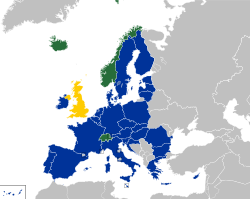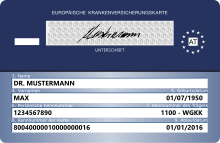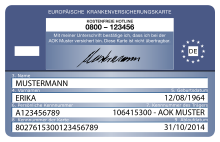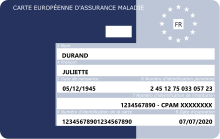European Health Insurance Card
| European Health Insurance Card | |
|---|---|
 | |
| Issued by | Member states of the European Economic Area[a][1] Switzerland United Kingdom[b][2] |
| First issued | 1 June 2004 |
| Purpose | Access to free or reduced cost health services in any EEA member state, Switzerland and the United Kingdom |
| Valid in | European Economic Area Switzerland United Kingdom[c] |
| Eligibility | EEA, Swiss or UK residency[d] |
| Cost | Free |
| European Union decision | |
| Text with EEA relevance | |
 | |
| Title | Decision No 189 of 18 June 2003 aimed at introducing a European health insurance card to replace the forms necessary for the application of Council Regulations (EEC) No 1408/71 and (EEC) No 574/72 as regards access to health care during a temporary stay in a Member State other than the competent state or the state of residence [3] |
|---|---|
| Made by | |
| Journal reference | [1] |
| Current legislation | |




The European Health Insurance Card (EHIC) is issued free of charge and allows anyone who is insured by or covered by a statutory social security scheme of the EEA countries and Switzerland to receive medical treatment in another member state free or at a reduced cost, if that treatment becomes necessary during their visit (for example, due to illness or an accident), or if they have a chronic pre-existing condition which requires care such as kidney dialysis. The term of validity of the card varies according to the issuing country. Continued reciprocal healthcare access between the EU and the UK has been agreed, and the UK is issuing a new UK Global Health Insurance Card (GHIC) valid in the EU.[4]
The intention of the scheme is to allow people to continue their stay in a country without having to return home for medical care; as such, it does not cover people who have visited a country for the purpose of obtaining medical care, nor does it cover non-urgent care that can be delayed until the individual returns to their home country (for example, most dental care). The costs not covered by self-liability fees are paid by the issuing country, which is usually the country of residence but may also be the country where one receives the most pension from.[5]
It only covers healthcare which is normally covered by a statutory health care system in the visited country, so it does not render travel insurance obsolete.
History[]
The card was phased in from 1 June 2004 and throughout 2005, becoming the sole healthcare entitlement document on 1 January 2006.
It replaced the following medical forms:
- E110 - For international road hauliers
- E111 - For tourists
- E119 - For unemployed people/job seekers
- E128 - For students and workers in another member state
Territorial applicability[]
The card is applicable in all French overseas departments (Martinique, Guadeloupe, Réunion, and French Guiana) as they are part of the EEA, but not non-EEA dependent territories such as Aruba, or French Polynesia.[6] However, there are agreements for the use of the EHIC in the Faroe Islands and Greenland,[7] even though they are not in the EEA.
Personal eligibility[]
The reason for the existence of this card, is that the right to health care in Europe is based on the country of legal residence, not the country of citizenship. Therefore, a passport is not enough to receive health care. It is however possible that a photo ID document is asked for, since the European Health Insurance Card does not contain a photo.
In some cases, even if a person is covered by the health insurance of an EU country, one is not eligible for a European Health Insurance Card. For instance, in Romania, a person who is currently insured has to have been insured for the previous five years to be eligible.[8]
Third party application processors[]
European Health Insurance cards are provided free to all legal residents of participating countries. There are however various businesses who act as non-official agents on behalf of individuals, arranging supply of the cards in return for payment, often offering additional services such as the checking of applications for errors and general advice or assistance.[9] This has proved extremely controversial. In 2010 the British government moved against companies that invited people to pay for the free EHIC, falsely implying that through payment the applicant could speed up the process.[10][11]
Participating member states[]
As of 2021, 31 countries in Europe participate: the 30 member states of the European Economic Area (EEA) plus Switzerland. This includes the 27 member states of the European Union (EU) and 4 member states of the European Free Trade Association (EFTA).[12]
Former participant states[]
United Kingdom[]
The United Kingdom was a participant in the scheme as a member of the European Union until its withdrawal from the organisation. It continued to participate provisionally until the end of the Brexit transition period on 31 December 2020.
The EU-UK Trade and Cooperation Agreement grants continued reciprocal healthcare access between the EU and the UK. EU citizens will be able to continue to use their EHIC within the UK,[13] while EHIC in the UK will be replaced by a new UK Global Health Insurance Card (GHIC).[14][15] However, the GHIC and UK-issued EHICs are not valid in Norway, Iceland, and Liechtenstein for most people. Only some can get a new UK-issued EHIC valid for visits to these countries as well Switzerland since 2022.[16][4]
During its participation in the scheme, EHIC access covered the British overseas territory of Gibraltar. The crown dependencies of the Channel Islands and Isle of Man were not supplied coverage under the EHIC due to having never been members of the EU and EEA, and their residents were not eligible for EHICs.[17]
Controversy[]
In August 2015 the Daily Mail ran a story about abuse of the EHIC system in which a card was issued to its undercover Hungarian reporter who “obtained the card after visiting the UK for less than one day” after another journalist posed as her landlord and presented a GP with the tenancy agreement of a property that neither occupied in order to get an NHS number. It claimed that "foreigners were charging the NHS for care in their own country." As The Guardian pointed out, the NHS issued a card to an individual that wasn't eligible to receive the card because a GP was duped into issuing an NHS number, and it was unclear what benefit would accrue as a result.[18]
The Huffington Post reported that only nine instances of low-level fraud involving the EHIC in the UK had been discovered in five years with a combined cost of £712.56.[19]
See also[]
- Healthcare in the European Union
- UK Global Health Insurance Card
- Italian health insurance card
- Carte Vitale
- European driving licence
Notes[]
- ^ The legal acquis is identified as EEA-relevant by the EU, and is incorporated into the EEA Agreement (by Iceland, Liechtenstein and Norway).
- ^ Under the Brexit Withdrawal Agreement, the UK continues to issue EHIC to certain individuals who gained entitlement before 1 January 2021.
- ^ Only EU member state-issued EHIC are valid after 31 December 2020. EHIC issued by EFTA members may remain valid where the individual has an ongoing relationship with the UK that started before 1 January 2021.
- ^ Only EU/EFTA citizens, UK state pensioners, frontier workers, workers posted abroad and students studying in the EU on or before 31 December 2020 and eligible family members resident in the UK are entitled to apply for an EHIC.
References[]
- ^ "Brexit : De la paperasse et des coûts supplémentaires en vue pour les Britanniques". Le Monde.fr. 13 July 2020.
- ^ "Get healthcare cover for travelling abroad". nhsbsa.nhs.uk. NHS Business Services Authority. 15 August 2018. Retrieved 6 January 2021.
- ^ "EUR-Lex - 32003D0751 - EN - EUR-Lex". eur-lex.europa.eu. Retrieved 26 August 2020.
- ^ a b "Healthcare for UK nationals visiting the EU". GOV.UK. Retrieved 2021-01-01.
- ^ "Are foreigners really gaming the NHS to pay for their medical treatment abroad?". 11 August 2015.
- ^ "UK FCO Travel Advice: French Polynesia". Fco.gov.uk. 2012-09-12. Retrieved 2012-10-12.
- ^ "UK FCO Travel Advice: Denmark". Fco.gov.uk. Retrieved 2012-10-12.
- ^ "Cardul european de asigurări de sănătate, eliberat gratuit". Libertatea.ro. 2009-08-01. Retrieved 2012-10-12.
- ^ "Third Party Application Processors". 2016-09-02. Retrieved 2016-06-03.
- ^ "BBC News - European health card scam stopped by OFT". Bbc.co.uk. 2010-08-10. Retrieved 2012-10-12.
- ^ "Consumers warned to be search engine savvy – Consumer Focus Wales". Consumerfocus.org.uk. 2011-06-22. Retrieved 2012-10-12.
- ^ "European Health Insurance Card". European Commission. Retrieved 2019-05-07.
- ^ "Press corner".
- ^ "Brexit: EU diplomats briefed on Brexit trade deal". BBC News. 25 December 2020.
- ^ "Apply for a free European Health Insurance Card (EHIC)". nhs.uk. 2018-08-15. Retrieved 2021-01-01.
- ^ "Health - Switzerland travel advice".
- ^ "Who is entitled to a UK's European Health Insurance Card (EHIC) after Brexit". 2 February 2020.
- ^ "Are foreigners really gaming the NHS to pay for their medical treatment abroad?". Guardian. 11 August 2015. Retrieved 22 August 2015.
- ^ "Exclusive: Migrant NHS Fraud Costs Only £700 Despite Fury Over Health Card Abuse. Government Accused Of 'Stoking Up Mistrust'". Huffington Post. 11 September 2015. Retrieved 18 September 2015.
External links[]
| Wikimedia Commons has media related to European Health Insurance Card. |
| Wikivoyage has an article for European Health Insurance Card. |
- Official website

- UK GHIC information at gov.uk
- UK GHIC application
- General UK GHIC information
- Irish EHIC site - includes details of coverage in various countries
- Dutch EHIC website
- The European Health Insurance Card: What It Is and How to Use It
- Health and the European Union
- Universal health care
- Health insurance cards